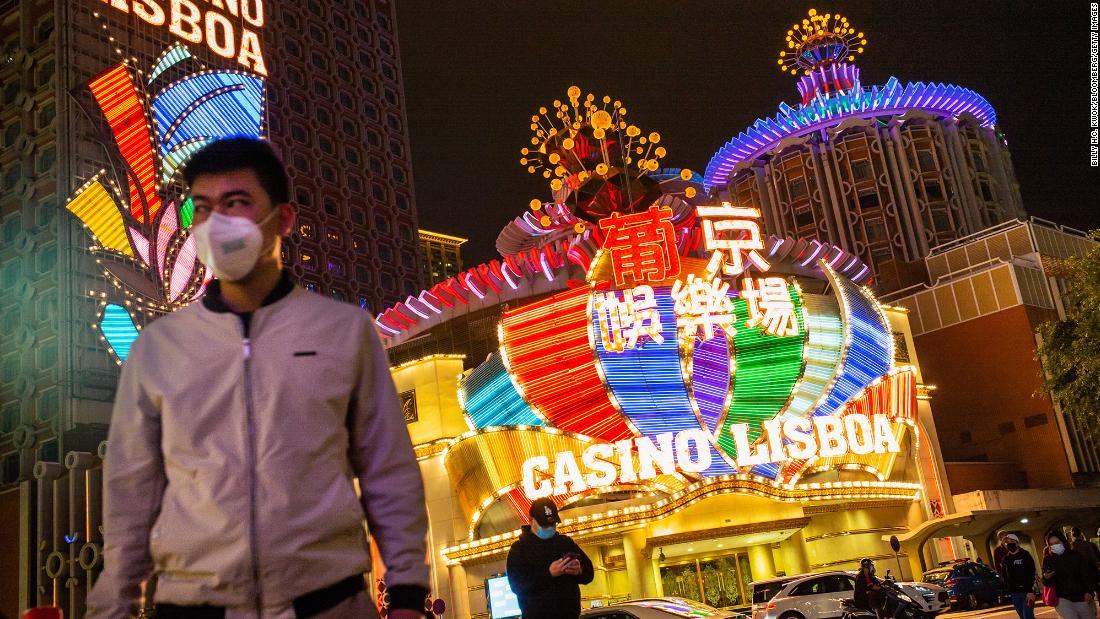
Macao’s latest restrictions were meant to last one week, but were later extended another week — ending Friday.
His team predicts that gross gaming revenue will slump 98% this month compared to July 2019 -— before the pandemic hit — assuming that casinos resume operation next week.
This spring, the broader gaming industry in Macao would have burnt an estimated $113 million to $260 million a month, according to an analysis by Goldman Sachs.
“It is very quiet on the ground here,” said Ben Lee, managing partner of IGamiX, a Macao-based gaming consultancy, adding that local small businesses had been virtually dealt “the death knell” by the new lockdown.
The city’s economic lifeblood
Macao, a tiny territory of some 600,000 people, is the only place in China where gambling is legal.
There have been calls to change that model. In January, the International Monetary Fund warned of Macao’s “overreliance on the gaming sector,” which it said had been brought into focus during the pandemic.
“The key growth driver in the past two decades … almost came to a stop as tourist flows dried up,” it noted, suggesting an urgent “need to diversify the economy.”
The sector is so crucial that it sometimes even seemed immune to “zero Covid” rules. In previous lockdowns, authorities notably refrained from closing the glitzy properties, even if it meant workers would have to sit in empty casinos “swatting flies,” said Lee.
“The Macao government has been very, very loathe to shut down the casinos, even when all other commercial activities have been instructed to close,” he added. “Why? Because the staff could still draw salaries.”
Now, officials face more pressure to fall in line with China’s hard stance on the virus, particularly as Macao battles its largest Covid outbreak since the start of the pandemic. The city has reported approximately 2,000 new cases since June, when the latest outbreak ended an eight-month streak of zero infections.
Another factor weighing on businesses lately is that officials have made it clear to casinos that they should not lay off workers, according to Lee.
While the unofficial edict has helped protect people’s livelihoods, it has exacerbated the financial strain on companies. Labor typically accounts for 20% to 25% of operating costs, Lee noted.
That, of course, is compounded by the recent plunge in traffic. In a report, analysts at Daiwa said that the liquidity of Macao’s casino operators had to be assessed, “amid [a] zero revenue environment.”
Cash crunch
The crisis is causing headaches for executives overseas.
Recently, both the Sands and Wynn have turned to their owners to help them weather the storm, with loans secured from each of their US parent companies, according to Bernstein analysts.
But the new restrictions also come at a particularly tricky time, as casino operators are soon expected to bid for a new license to continue operating in Macao, said Lee.
The process requires significant proof of liquidity — essentially hundreds of millions of dollars in cash, he added.
So while businesses are already strapped, “the parent companies for these highly leveraged subsidiaries have to inject cash into the Macao subsidiaries, [and] they have to carry the burden over in the States, or wherever they are,” Lee said.
Despite the turmoil, Lee doesn’t expect any operators to miss their chance to throw their hats in the ring for new licenses. Companies have already incurred heavy “sunk costs” in Macao, he said, pointing to some that had recently renovated properties or made other big investments just before the pandemic.
“They cannot afford to withdraw, because if they withdraw, they’ve got nothing.”
— Shawn Deng in Toronto, and Lauren Lau and Akanksha Sharma in Hong Kong contributed to this report.
